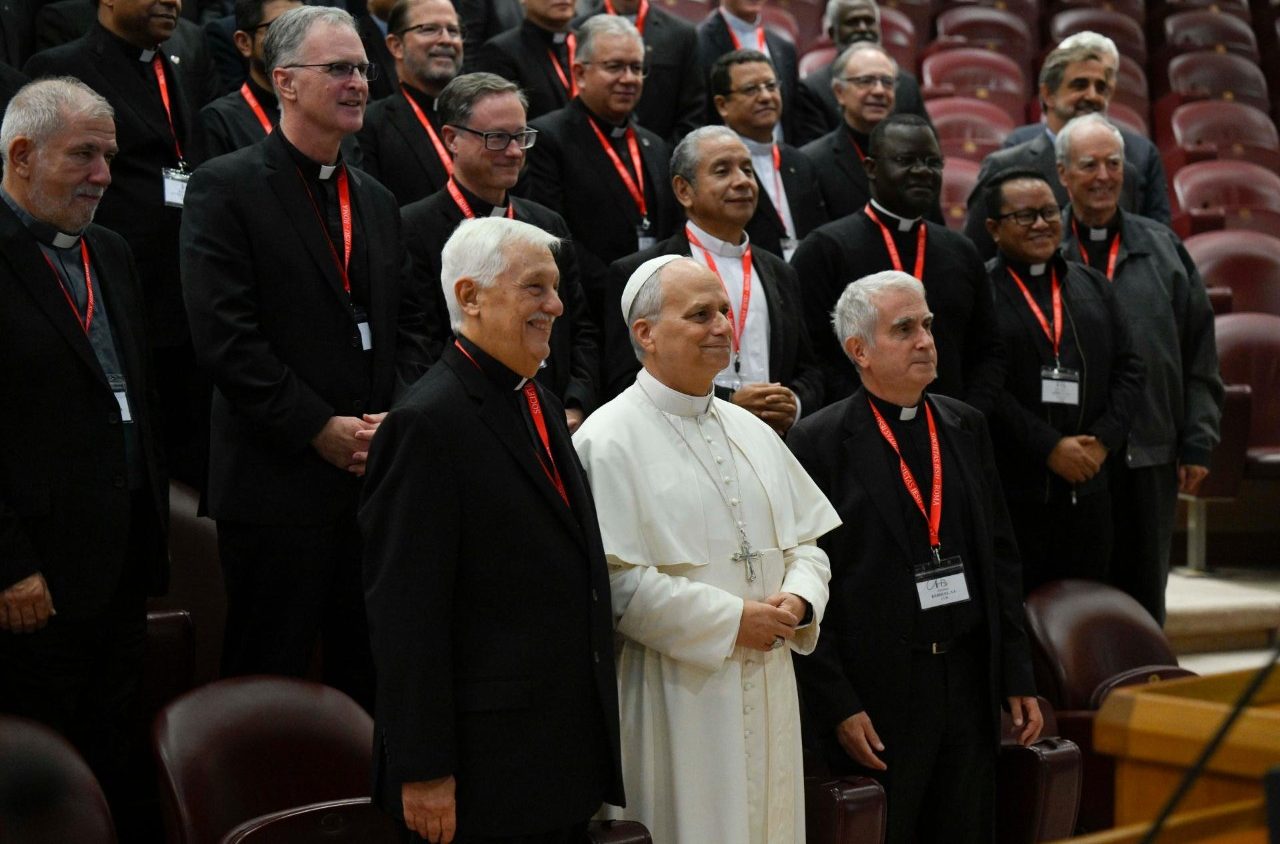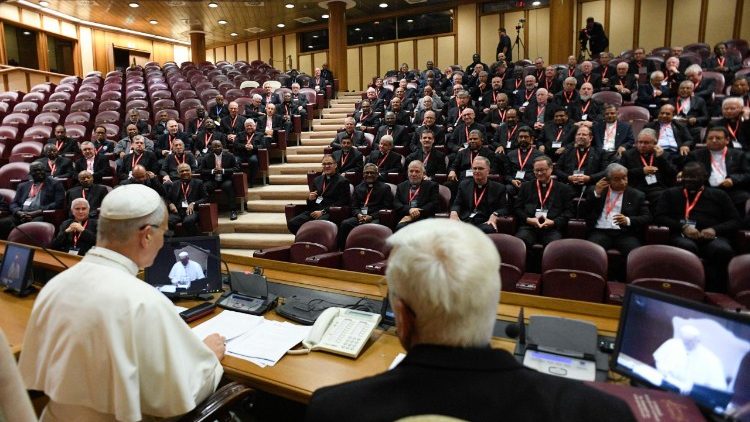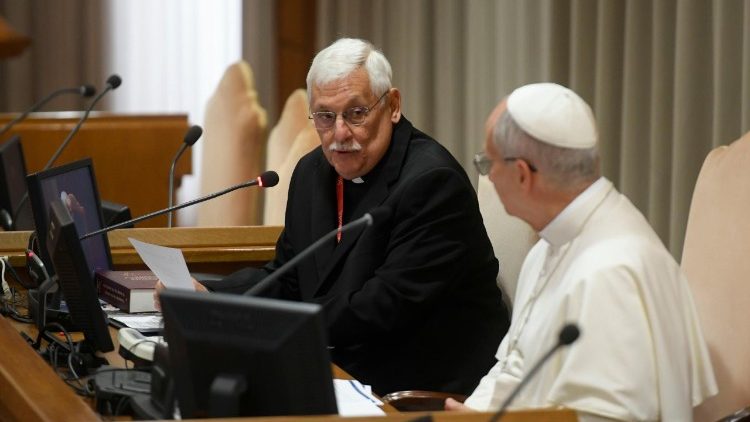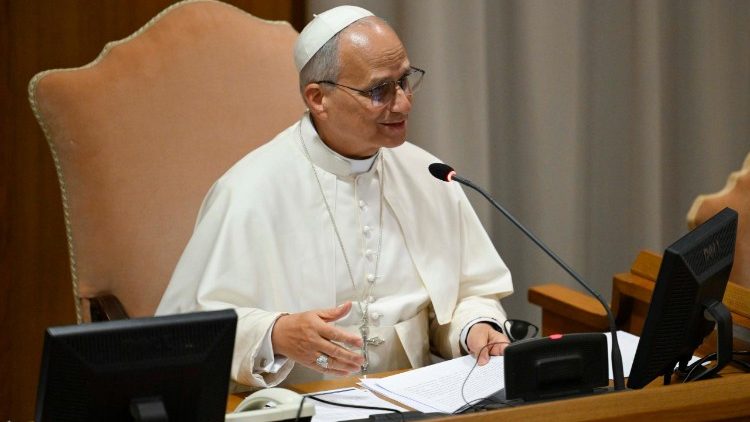
Pope Leo to Jesuits: ‘Go to the frontiers with courage and discernment’
Pope Leo XIV addresses the Major Superiors of the Society of Jesus, urging them to remain faithful to their missionary tradition of discernment and service at the frontiers of culture, faith, and human need.
By Linda Bordoni
Speaking in the Vatican to participants of the Meeting of the Major Superiors of the Society of Jesus (MMS), the Pope thanked Jesuit Superior General Fr. Arturo Sosa and encouraged the Society “to discern new ways of living out your mission in today’s world.”
The MMS — the first since 2005 — brings together around 100 Jesuits from across the globe, including Provincials, Regional Superiors, and Conference Presidents. The ten-day meeting, which began on 17 October, includes moments of reflection, communal discernment, and a Jubilee pilgrimage through the Holy Door.
READ POPE LEO’S FULL DISCOURSE HERE
Called to the frontiers
In his wide-ranging address, Pope Leo XIV described the present as “a change of epoch,” marked by rapid transformations in culture, technology, and politics. “Artificial intelligence and other innovations are reshaping our understanding of work and relationships, and even raising questions about human identity,” he said, noting also the threats of ecological degradation, inequality, and polarisation.
“Yet into this world, Christ still sends his disciples,” he affirmed, recalling how Saint Ignatius of Loyola and his companions “did not fear uncertainty or difficulty; they went to the margins, where faith and reason intersected with new cultures and great challenges.”
Quoting Saint Paul VI’s 1974 address to the Jesuits, the Pope reiterated: “Wherever in the Church, even in the most difficult and extreme fields… There have been, and there are, Jesuits.”
“Today,” he continued, “I repeat: the Church needs you at the frontiers, whether they be geographical, cultural, intellectual or spiritual. These are places of risk, where familiar maps are no longer sufficient.”
The Pope invited Jesuits to discern boldly and to practice the Ignatian principle of “holy indifference,” which he described as “the readiness to let go of cherished structures or roles when the Spirit leads the apostolic body elsewhere for a greater good.”
Synodality and reconciliation
Among the “major frontiers” facing the Church today, Pope Leo XIV highlighted the path of synodality, calling it a journey that “requires listening more deeply to the Holy Spirit and to one another.” He thanked the Society for its contributions to the synodal process and for helping ecclesial communities “walk together in hope.”
Turning to the theme of reconciliation, he said the world continues to suffer from “conflict, inequality and abuse,” and that many wounds “remain unhealed across generations and peoples.”
“We must oppose the globalisation of powerlessness with a culture of reconciliation – meeting one another in truth, forgiveness and healing,” the Pope said, urging Jesuits to become “experts in reconciliation, confident that good is stronger than evil.”
Discernment amid technological change
Pope Leo XIV devoted part of his address to the ethical challenges posed by new technologies, particularly artificial intelligence. He called this an “important frontier,” observing that while it holds great potential, it also carries risks “of isolation, loss of work and new forms of manipulation.”
“The Church must help guide these developments ethically, defending human dignity and promoting the common good,” he said. “We need to discern how to use digital platforms to evangelise, to form communities and to challenge the false gods of consumerism, power and self-sufficiency.”
Universal Apostolic Preferences
Referring to the four Universal Apostolic Preferences of the Society of Jesus, confirmed in 2019 by his predecessor, Pope Francis, Pope Leo XIV described them as “frontiers calling for discernment and courage.”
Recalling the first Preference, he encouraged Jesuits to lead people to God “through the Spiritual Exercises and discernment,” noting that “many today search for meaning, often without realising it.” Citing Saint Augustine, he said: “You have made us for yourself, O Lord, and our hearts are restless until they rest in you.”
He called on Jesuits to “meet people in that restlessness… in retreat houses, universities, social media, parishes and informal spaces where seekers gather,” and to remain “contemplatives in action, rooted in daily intimacy with Christ.”
Addressing the second Preference – walking with the poor and excluded – the Pope denounced “an economic system driven by profit above the dignity of the person,” citing his recent exhortation Dilexi Te in which he warned against “the dictatorship of an economy that kills.”
“This global imbalance pushes countless people to migrate in search of survival,” he said. “True discipleship requires both denunciation of injustice and the proposal of new models rooted in solidarity and the common good.”
He encouraged Jesuit institutions — including universities, social centres, publications, and the Jesuit Refugee Service — to “promote systemic change” and to resist “compassion fatigue or fatalism,” trusting instead “in the transformative power of God’s love.”
Walking with the young and caring for creation
Turning to the third Preference – accompanying young people — Pope Leo XIV said that youth “share a thirst for authenticity and transformation” and that the Church must “find and speak their language.”
“It is important to form spaces where they can encounter Christ, discover their vocation, and work for the Kingdom,” he said, noting that the upcoming World Youth Day in Korea will be “a key moment for this mission.”
Regarding care for our common home – the fourth Preference – the Pope described ecological conversion as “deeply spiritual,” calling for “renewing our relationship with God, with one another and with creation.”
“Let your communities be examples of ecological sustainability, simplicity and gratitude for God’s gifts,” he said, echoing Pope Francis’ Laudato Si’ and its call for integral ecology.
“Remain with Christ”
Concluding his address, Pope Leo XIV invited the Jesuits to remain close to Jesus through prayer, the Sacraments, and community life.
“From this rootedness,” he said, “you will have the courage to walk anywhere: to speak truth, to reconcile, to heal, to labour for justice, to set captives free. No frontier will be beyond your reach if you walk with Christ.”
He expressed his hope that the Society of Jesus may continue to “read the signs of the times with spiritual depth,” embracing “what promotes human dignity” and remaining “agile, creative, discerning and always in mission.”
“May the Lord lead you to the frontiers of today and beyond,” the Pope concluded, “renewing the Church and building a Kingdom of justice, love and truth.”
First Appeared on
Source link









